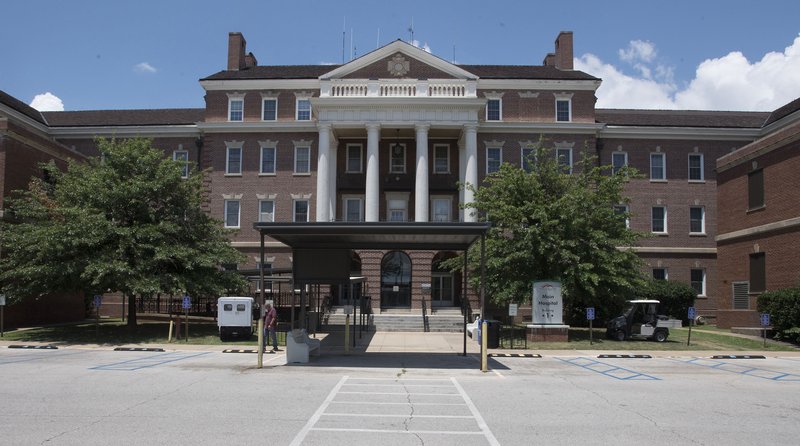FAYETTEVILLE -- The trial in the first of eight lawsuits over missed diagnoses by a Veterans Health Care System of the Ozarks pathologist began Tuesday with two hours of recorded testimony from a patient who died in 2020.
Jerry R. Kolpek, 83, of Bella Vista had his prostate cancer diagnosis missed by Dr. Robert Morris Levy, according to his estate's lawsuit in federal court against the health care system.
Levy reviewed the pathology materials and incorrectly found the sampled tissues to be benign in 2012, the lawsuit states.
Levy served as chief pathologist for the health care system until he was suspended after a March 1, 2018, arrest in Fayetteville on a charge of driving under the influence.
He was later fired after a U.S. Department of Veterans Affairs investigation concluded Levy had worked while intoxicated for years.
Reexamination of Levy's work on 33,902 cases from 2005 to 2017 found 3,029 errors, 30 of them serious enough to have lasting health consequences. Levy examined six of Kolpek's tissue samples on Jan. 30, 2012, according to court documents.
Kolpek moved to Clear Lake, Iowa, in 2014 to be near family after his wife, Jo, developed health problems. He was still active until informed in 2018 of the missed diagnosis, according to a video recording taken on Feb. 26, 2019.
Videos taken of Kolpek by Kris Raper, chief investigator on Levy's case for the VA Office of Inspector General and by Kolpek's family's attorneys were played at Tuesday's trial in Fayetteville.
U.S. District Judge Timothy Brooks is presiding at the trial, which is expected to conclude today.
Raper was also called to the stand Tuesday by the family's attorneys.
Kolpek told Raper and others he received news of his missed diagnosis in a conference call. He then went to the veterans hospital in Des Moines, Iowa, for tests. Those tests found the cancer had spread into his bones, extending from the base of his skull to his pelvis, including his backbone and ribs.
Doctors told him his weakened skeleton meant he would not survive, for instance, a car crash if his air bag deployed, Kolpek said. He went from an active traveler, golfer and football fan who attended games to being home-bound almost immediately, he said, and dependent on others.
As Kolpek's disease progressed, the muscles pulling on his bones during regular movement caused persistent pain, he said.
"I can't change out a light bulb," Kolpek said.
His doctors told him not to lift anything weighing more than four pounds, he said, and he could no longer lift his arms above his head. Kolpek died on Dec. 31, 2020.
Despite his 83 years, Kolpek said he had no other serious health problems after a successful bypass operation years before Levy's cancer check, and his father and all six of his father's brothers had lived into their 90s.
Kolpek described his condition dispassionately until he spoke of no longer being able to visit his wife, who was in a nearby assisted living facility and who died of cancer shortly after he learned of the missed diagnosis.
Two of Kolpek's granddaughters and his daughter, Kristie Whitehill, all of Mason City, Iowa, testified Tuesday.
"Toward the end, he couldn't get off the couch to come give me a hug," testified granddaughter McKenna Whitehill.
Granddaughter Emma Kolpek testified Kolpek thought of his own father's death.
"It made him think of what his kids would be losing," she said.
Kristie Whitehill became her father's chief caregiver after he learned of the cancer's extent, according to her and other witnesses.
"He was a great dad, but he really excelled as a grandfather," Kristie Whitehill said.
He was absent from home as much as a week at a time as a railroad engineer when his children were young, but thrived during retirement, she said. He and his wife kept a home in Minnesota where the grandchildren would go in the summer where they would fish, swim and spend time, she said.
The U.S. Department of Justice successfully prosecuted Levy for involuntary manslaughter last year. Levy pleaded guilty in June 2021 to one count of manslaughter for missed diagnoses. He was sentenced in January to 20 years in federal prison.
The suit over Kolpek's death is the first of eight filed brought by survivors of five veterans who died and three surviving veterans over missed diagnoses by Levy.
The Kolpek family seeks at least $15 million in damages. Attorneys for the government do not deny the family is due compensation, but not to that amount, they told Brooks. Brooks will decide the case, not a jury.
Levy's 3,029 errors out of 33,902 cases made for an error rate of 8.9% compared to a pathology practice average of 0.7%, a Department of Veterans Affairs review found.
Evidence and witness testimony the Justice Department gathered or used against Levy is cited extensively in each of the wrongful death lawsuits. The evidence includes a VA inspector general's report that said investigators found a culture at the health care center in which staff did not report serious concerns about Levy, in part because of a perception that others had reported or they were concerned about reprisal.
"Any one of these breakdowns could cause harmful results," the report reads. "Occurring together and over an extended period of time, the consequences were devastating, tragic and deadly."
Levy was in charge of the quality management program of his own department, the inspector general found. This situation went on for 12 years, the report noted.
At one point in his video testimony Tuesday, Kolpek's brother Lanny Kolpek was asked what he missed most about his brother.
"Everything," he replied.

